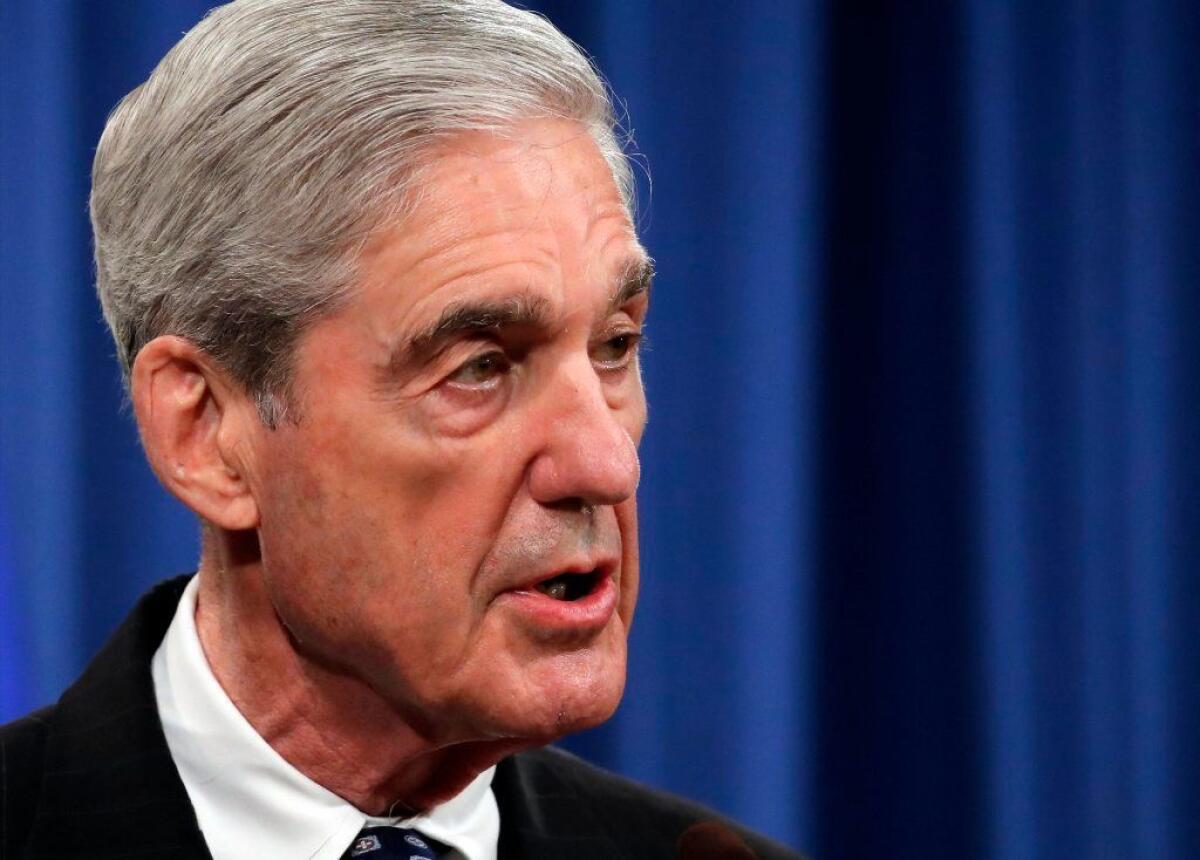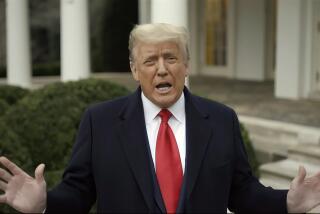Mueller’s testimony could make or break Democrats’ impeachment push

- Share via
WASHINGTON — Robert S. Mueller III, who led a special counsel investigation that cast a cloud over the White House for nearly two years, will testify for the first time Wednesday about the Russia investigation in back-to-back House hearings that could bolster support for impeachment — or cripple it.
Although Mueller has vowed to confine his remarks to material included in his 448-page final report, the nationally televised hearings could prove momentous if lawmakers prod the former FBI director to reveal significant new details or if his presentation changes how Americans view the investigation’s outcome and President Trump’s role.
Mueller’s investigation led to charges or indictments against 34 individuals, including 25 Russians, but no one was charged with conspiring with the Russians. And while Mueller detailed multiple incidents when the president sought to thwart the investigation, he declined to say whether Trump broke the law, citing Justice Department guidelines that bar indicting a sitting president.
Atty. Gen. William Barr ultimately decided that Trump’s actions did not amount to criminal misconduct.
Democrats and Republicans have opposing tactics and goals for the hearings, first before the House Judiciary Committee and then before the House Intelligence Committee.
“Tomorrow is going to be an important step forward on the question of accountability with respect to the abhorrent . . . and potentially criminal behavior that Bob Mueller uncovered as part of his investigation,” said Rep. Hakeem Jeffries (D-N.Y.), a member of the judiciary panel.
Some Trump opponents hope Mueller’s five hours of testimony will persuade more Democratic lawmakers — and a skeptical public — to back impeachment proceedings against Trump, a process that House Speaker Nancy Pelosi (D-San Francisco) and other Democratic leaders view as politically unwise with the 2020 election cycle already underway.
Pelosi said she’ll be keeping an eye on the hearings.
“I’m going to watch as much as I can in my office,” she said.
Republicans are preparing to portray Mueller’s investigation as politically biased from the start and carried out for partisan purposes. They argue that it ultimately cleared the president of wrongdoing and that the country should put Mueller and his efforts in the rearview mirror.
Mueller never spoke publicly during the 22-month investigation, and he delivered only a brief statement in May — pointedly emphasizing that his report did not exonerate the president — before stepping down as special counsel. His relative silence has only increased anticipation for his testimony, which he agreed to provide only after receiving a subpoena.
Democrats on the Judiciary Committee will likely focus on Trump’s efforts to block or limit the investigation, including Trump’s attempts to fire Mueller and prevent witnesses from cooperating. The material was covered in the second half of Mueller’s report.
On Sunday, the committee chairman, Rep. Jerrold Nadler (D-N.Y.) said the report presents “very substantial evidence” that Trump is “guilty of high crimes and misdemeanors,” an impeachable offense under the Constitution.
“We have to ... let Mueller present those facts to the American people, and then see where we go from there, because the administration must be held accountable,” Nadler said on “Fox News Sunday.” His committee would lead any impeachment proceedings.
Democrats on the Intelligence Committee will ask Mueller about the first half of his report, which involves Moscow’s covert efforts to interfere in the 2016 election.
The report said Russia hacked Democratic Party emails, which were later released by WikiLeaks, and spread disinformation on social media in order to undermine the U.S. political system and boost Trump’s candidacy.
Although the report said Trump welcomed foreign meddling, the investigation did not establish a criminal conspiracy between the president’s team and Moscow.
Mueller earned a reputation as a terse witness in congressional hearings during the 12 years he served as FBI director, and before that as a senior Justice Department official. His penchant for tight-lipped responses may lead to clashes with both Democrats and Republicans.
Among those who faced charges from the Mueller investigation were Trump’s former campaign chairman, Paul Manafort; his former national security advisor, Michael Flynn; and his former lawyer and fixer, Michael Cohen. Manafort was convicted at trial, while Flynn and Cohen pleaded guilty.
Trump’s longtime political advisor, Roger Stone, is scheduled to stand trial in November on charges of lying to Congress about his conversations involving WikiLeaks. Stone has pleaded not guilty.
Times staff writer Jennifer Haberkorn contributed to this report.
More to Read
Get the L.A. Times Politics newsletter
Deeply reported insights into legislation, politics and policy from Sacramento, Washington and beyond. In your inbox twice per week.
You may occasionally receive promotional content from the Los Angeles Times.











